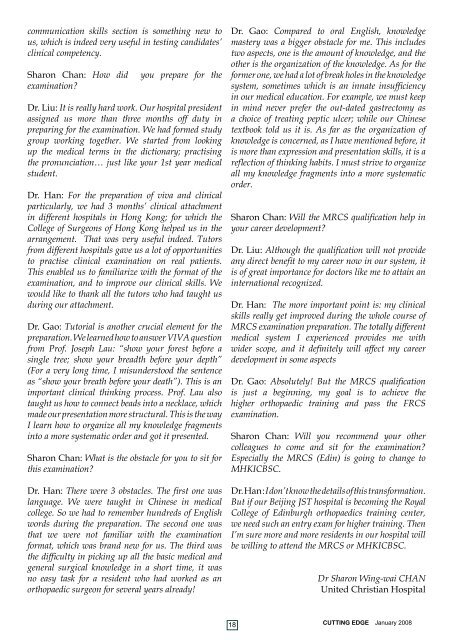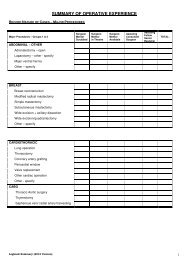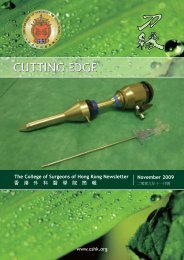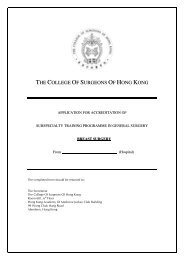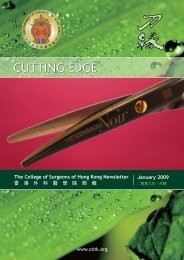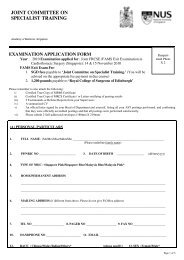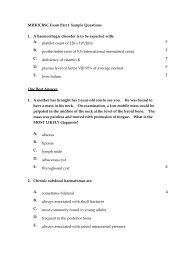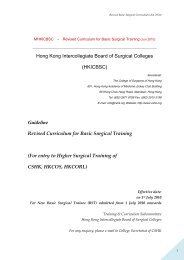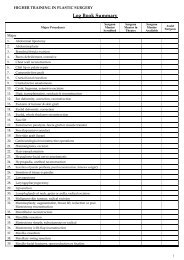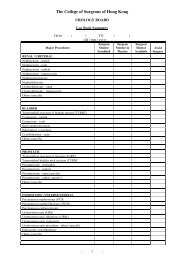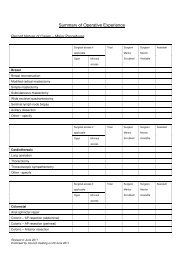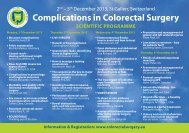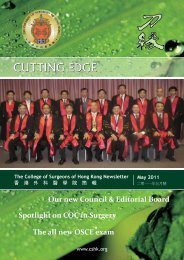CUTTING EDGE January 2008 - The College of Surgeons of Hong ...
CUTTING EDGE January 2008 - The College of Surgeons of Hong ...
CUTTING EDGE January 2008 - The College of Surgeons of Hong ...
Create successful ePaper yourself
Turn your PDF publications into a flip-book with our unique Google optimized e-Paper software.
communication skills section is something new to<br />
us, which is indeed very useful in testing candidates’<br />
clinical competency.<br />
Sharon Chan: How did<br />
examination<br />
you prepare for the<br />
Dr. Liu: It is really hard work. Our hospital president<br />
assigned us more than three months <strong>of</strong>f duty in<br />
preparing for the examination. We had formed study<br />
group working together. We started from looking<br />
up the medical terms in the dictionary; practising<br />
the pronunciation… just like your 1st year medical<br />
student.<br />
Dr. Han: For the preparation <strong>of</strong> viva and clinical<br />
particularly, we had 3 months’ clinical attachment<br />
in different hospitals in <strong>Hong</strong> Kong; for which the<br />
<strong>College</strong> <strong>of</strong> <strong>Surgeons</strong> <strong>of</strong> <strong>Hong</strong> Kong helped us in the<br />
arrangement. That was very useful indeed. Tutors<br />
from different hospitals gave us a lot <strong>of</strong> opportunities<br />
to practise clinical examination on real patients.<br />
This enabled us to familiarize with the format <strong>of</strong> the<br />
examination, and to improve our clinical skills. We<br />
would like to thank all the tutors who had taught us<br />
during our attachment.<br />
Dr. Gao: Tutorial is another crucial element for the<br />
preparation. We learned how to answer VIVA question<br />
from Pr<strong>of</strong>. Joseph Lau: “show your forest before a<br />
single tree; show your breadth before your depth”<br />
(For a very long time, I misunderstood the sentence<br />
as “show your breath before your death”). This is an<br />
important clinical thinking process. Pr<strong>of</strong>. Lau also<br />
taught us how to connect beads into a necklace, which<br />
made our presentation more structural. This is the way<br />
I learn how to organize all my knowledge fragments<br />
into a more systematic order and got it presented.<br />
Sharon Chan: What is the obstacle for you to sit for<br />
this examination<br />
Dr. Han: <strong>The</strong>re were 3 obstacles. <strong>The</strong> first one was<br />
language. We were taught in Chinese in medical<br />
college. So we had to remember hundreds <strong>of</strong> English<br />
words during the preparation. <strong>The</strong> second one was<br />
that we were not familiar with the examination<br />
format, which was brand new for us. <strong>The</strong> third was<br />
the difficulty in picking up all the basic medical and<br />
general surgical knowledge in a short time, it was<br />
no easy task for a resident who had worked as an<br />
orthopaedic surgeon for several years already!<br />
Dr. Gao: Compared to oral English, knowledge<br />
mastery was a bigger obstacle for me. This includes<br />
two aspects, one is the amount <strong>of</strong> knowledge, and the<br />
other is the organization <strong>of</strong> the knowledge. As for the<br />
former one, we had a lot <strong>of</strong> break holes in the knowledge<br />
system, sometimes which is an innate insufficiency<br />
in our medical education. For example, we must keep<br />
in mind never prefer the out-dated gastrectomy as<br />
a choice <strong>of</strong> treating peptic ulcer; while our Chinese<br />
textbook told us it is. As far as the organization <strong>of</strong><br />
knowledge is concerned, as I have mentioned before, it<br />
is more than expression and presentation skills, it is a<br />
reflection <strong>of</strong> thinking habits. I must strive to organize<br />
all my knowledge fragments into a more systematic<br />
order.<br />
Sharon Chan: Will the MRCS qualification help in<br />
your career development<br />
Dr. Liu: Although the qualification will not provide<br />
any direct benefit to my career now in our system, it<br />
is <strong>of</strong> great importance for doctors like me to attain an<br />
international recognized.<br />
Dr. Han: <strong>The</strong> more important point is: my clinical<br />
skills really get improved during the whole course <strong>of</strong><br />
MRCS examination preparation. <strong>The</strong> totally different<br />
medical system I experienced provides me with<br />
wider scope, and it definitely will affect my career<br />
development in some aspects<br />
Dr. Gao: Absolutely! But the MRCS qualification<br />
is just a beginning, my goal is to achieve the<br />
higher orthopaedic training and pass the FRCS<br />
examination.<br />
Sharon Chan: Will you recommend your other<br />
colleagues to come and sit for the examination<br />
Especially the MRCS (Edin) is going to change to<br />
MHKICBSC.<br />
Dr. Han : I don’t know the details <strong>of</strong> this transformation.<br />
But if our Beijing JST hospital is becoming the Royal<br />
<strong>College</strong> <strong>of</strong> Edinburgh orthopaedics training center,<br />
we need such an entry exam for higher training. <strong>The</strong>n<br />
I’m sure more and more residents in our hospital will<br />
be willing to attend the MRCS or MHKICBSC.<br />
Dr Sharon Wing-wai CHAN<br />
United Christian Hospital<br />
18<br />
<strong>CUTTING</strong> <strong>EDGE</strong> <strong>January</strong> <strong>2008</strong>


